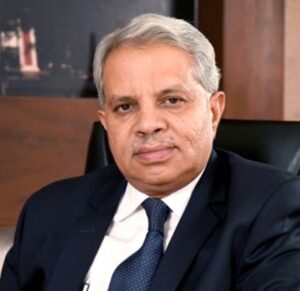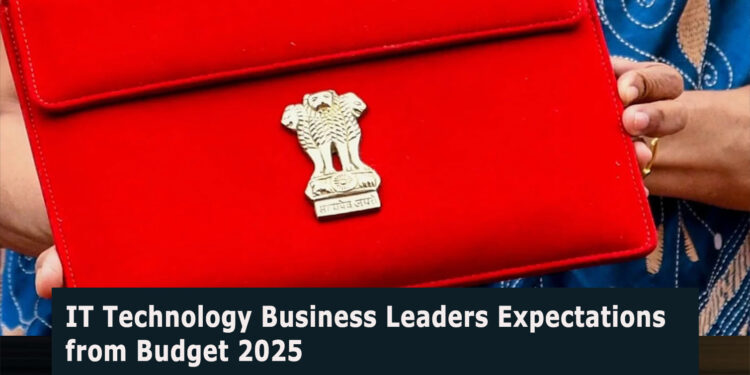Pre-Budget 2025 Expectations: As the Union Budget 2025 approaches, IT, Technology, and cybersecurity leaders have outlined several key expectations to foster growth and innovation, drive digital transformation, and prioritize AI, cloud computing, and cybersecurity policies to enhance the country’s position as a global tech hub.
The sector, which has been a key driver of economic growth, is looking for strategic government support to address challenges. Prioritize focus on emerging technologies like AI, GenAI, machine learning, cloud computing, and 5G to make a favorable ecosystem for startups, R&D, and digital infrastructure development.
Finance Minister Nirmala Sitharaman will table the Budget in Lok Sabha on February 1, 2025.
Amit Chadha, CEO & Managing Director, L&T Technology Services and NASSCOM Executive Council member

“India’s growth trajectory is at an exciting juncture, and we anticipate that the upcoming budget will play a crucial role in fostering technological advancements. The Government of India’s efforts to drive economic growth and promote innovation has been noteworthy. The Production Linked Incentive (PLI) Scheme has been a significant step in boosting manufacturing capabilities and encouraging investment.
At LTTS, we strongly believe that the government’s sustained emphasis on incentivizing investments in R&D and creating a conducive ecosystem for technology-led advancements can unlock immense potential for engineering services firms. Such initiatives will not only strengthen India’s standing as a preferred destination for global ER&D but also catalyze economic growth by delivering value across sectors like manufacturing, energy, and mobility. We expect the budget to further accelerate India’s growth momentum by introducing policies that promote investments in research and development, digital transformation and advanced skill development.
We are optimistic that the budget will introduce policies supporting innovation, sustainability, and growth, aligning with initiatives like the National Green Hydrogen Mission. This will likely foster a business-friendly environment, boosting investments in research and development, digital transformation, and skill development, ultimately driving India’s growth momentum forward.”
Sunil Sharma, Vice President – Sales (India & SAARC) at Sophos

“Ahead of the Union Budget 2025-26, we look forward to measures that will further strengthen the nation’s cybersecurity framework.
As the nation increases its investments in digital transformation and integration of artificial intelligence, it increases the need for proactive cybersecurity measures. Data breaches have taken over the news in the past year as critical sectors have been targeted. Adding to the threat of exploited vulnerabilities such as malicious links or confidential data being leaked, enterprises and employees alike have had to reconsider whether what meets the eye is the truth due to highly advanced deepfakes.
Additionally, as enterprises take on digital transformation or AI adoption, the focus on cybersecurity may fall by the wayside as there is a gap between the supply and demand of skilled cybersecurity resources. Mitigating this issue requires investments in cybersecurity courses in educational institutes as well as continuous skilling opportunities for those already working. This will ensure that enterprises remain abreast with knowledge about all possible risks as well as the solutions.
With advancements in proactive cybersecurity, India can reinforce trust in its digital economy while ensuring sustainable growth in a rapidly evolving cyber landscape.”
Puneet Gupta, VP and MD at NetApp India

“The upcoming Union Budget 2025. presents a unique opportunity to accelerate our digital transformation journey. To fully harness the potential of AI and emerging technologies, the government should prioritize investments in building intelligent data infrastructure. Robust and scalable data solutions will serve as the backbone for AI readiness. It will enable businesses to leverage data efficiently and securely while driving innovation. Incentives for cloud adoption, data localization frameworks, and public-private partnerships in technology can further bolster India’s digital economy.
A future-ready data ecosystem is essential for fostering economic growth, job creation, and global competitiveness in the age of AI.”
Shrirang Deshpande, Strategic Program Head, Vertiv India

“The adoption of technologies like artificial intelligence (Al), cloud computing, and 5G, as well as exponential data consumption, are driving India’s booming digital economy. The industry is expected to grow at a compound annual growth rate (CAGR) of 15.07% to reach $10.09 billion by 2027.
India has established itself as a desirable worldwide hub for data center development thanks to its extensive linked power system, investments in renewable energy, and smart digital efforts. India’s skills perfectly complement the global emphasis on dependable and sustainable data solutions. We anticipate measures supporting the rise of data centers as the Union Budget draws near, such as incentives for integrating green energy, simplified regulations for expanding infrastructure as well as initiatives to improve connectivity in tier-2 and tier-3 cities, generating employment opportunities. Additionally, targeted policies could streamline processes for data centre vendors, enabling them to invest in advanced technologies and infrastructure.”.
Pramod Sharda, CEO of IceWarp India and Middle East

“As we approach the Union Budget 2025, we anticipate strategic reforms that bolster India’s digital ecosystem and drive technological self-reliance. The past few years have highlighted the transformative power of digital adoption across industries, and it is imperative that this momentum is sustained through forward-thinking policies.
We hope the government continues to prioritize investments in digital infrastructure, particularly in Tier 2 and Tier 3 cities, to bridge the digital divide and unlock the untapped potential of these regions. A reduction in GST rates on enterprise technology solutions would encourage businesses to adopt advanced tools, boosting productivity and fostering innovation.
Additionally, it is crucial to address cybersecurity, as the rise in digital adoption brings with it the need for robust frameworks to safeguard data and digital assets. Incentivizing investments in R&D for indigenous technology development will also be a step towards achieving digital independence. Startups in the technology domain are a driving force behind India’s economic growth. We look forward to budgetary provisions that support their scaling efforts through relaxed compliance, simplified taxation, and increased funding opportunities.“
Girish Hirde, Global Delivery Head at InfoVision

“As we approach Union Budget 2025, InfoVision anticipates a forward-looking agenda that addresses the transformative potential of AI and other cutting-edge technologies. We expect robust provisions to maintain India’s global competitiveness in the rapidly evolving tech landscape. Key areas we hope to see addressed include investments in AI infrastructure, the establishment of clear ethical guidelines for AI development, and tax incentives for companies investing in AI and emerging tech training programs.
Furthermore, we look forward to support for telecom advancements, particularly in 5G and 6G infrastructure, which are crucial for enabling AI and IoT applications at scale. We also anticipate increased allocation for cybersecurity to strengthen India’s digital defenses, enhanced funding for AI and deep-tech startups, and incentives for AI integration across sectors like healthcare, agriculture, and manufacturing. By focusing on these areas, Budget 2025 can lay the foundation for India to lead in the AI era, creating sustainable job opportunities and driving optimal growth in the digital.”
Sunil Sapra, Co-Founder & Chief Growth Officer of Eventus Security

“With the upcoming Union Budget 2025, we expect a continued focus on strengthening India’s cybersecurity framework. As cyber threats evolve, it’s imperative for the government to prioritize investments in cybersecurity infrastructure and initiatives that enhance national resilience against emerging cyberattacks. Public-private partnerships will be instrumental in driving innovation and ensuring that organizations, especially SMEs, gain equitable access to advanced security technologies.
Further, it is important to include provisions that support skill development in the cybersecurity sector, nurturing a robust talent pool capable of safeguarding our digital ecosystem. The increased adoption of AI and machine learning for threat detection and response also presents an opportunity to scale up our defense mechanisms.
A forward-looking, holistic cybersecurity strategy in this year’s budget will not only secure India’s digital future but also act as a catalyst for sustained economic growth and global competitiveness.”
Ankur Mittal, Co-founder of Inflection Point Ventures
“Tax parity between both domestic and international funds is critical to building a strong alternative investment environment in India. Harmonizing the tax treatment of international and local investors in Indian Alternative Investment Funds (AIFs) will not only provide a fair playing field, but will also boost India’s appeal as a competitive global capital destination.
By addressing the underlying disparity, the government can demonstrate its commitment to inclusion, economic change, and long-term growth in the investment environment.”
Joseph Sudheer Thumma, Global Chief Executive Officer & Managing Director of Magellanic Cloud

“In an era of rapid Gen AI, and cloud computing, we expect the government’s upcoming budget to prioritize policies that foster innovation and address the evolving needs of the tech sector. This includes continued support for R&D in cutting-edge technologies, initiatives to bridge the digital divide and enhance digital literacy, and a focus on developing a robust infrastructure to safeguard our digital assets.
We believe these measures will be crucial for India to maintain its competitive edge in the global technology landscape.”
Jyoti Sharma, CEO, Nasscom Foundation
“Technology continues to serve as a powerful catalyst in bridging digital inequality and driving India’s economic growth and development. With the upcoming Union Budget 2025, we hope to see a strong commitment to advancing technology adoption and digital transformation, creating lasting impact for communities, including women, the rural population, and the overall economy.
Targeted investments in upskilling and reskilling programs will be critical in equipping our youth with future-ready skills and unlocking opportunities in a dynamic job market and should continue to be a priority. Also, India’s deep-tech ecosystem is on the cusp of exponential growth – especially with AIForSocialGood showing great potential. Strengthening the social innovation landscape through accelerators, incubators, and dedicated support for innovation will further pave the way for sustainable growth”
Bruce Keith, CEO and Co-founder of InvestorAI
“2025 is expected to be dominated by global geopolitics and this will cause ongoing market volatility and short-term pain. With a currency already depreciating, I see the immediate impact of Trump Tariffs as being reduced and giving the Government space to re-energize its infrastructure investment.
I see India as a destination of choice for overseas investors. However, the Indian government should find more ways to encourage citizens to take part in equity markets – realizing that your savings are being eaten by inflation in real terms usually happens too late and tends to disadvantage the lower-income strata of society.
Budget being once in a year event may not please everyone Whatever happens, the Budget will not please everyone, however, we will all benefit in the long term from infrastructure especially as demographics defines destiny.”
Mohan Krishnamurthy Madwachar, Country Manager of Sattrix Information Security Limited

“Pre-Budget 2025 is a pivotal opportunity to strengthen India’s position as a digital powerhouse. As we continue to advance in areas like AI, cloud computing, and cybersecurity, there is an urgent need for policies that support robust IT infrastructure and prioritize data security. We hope this budget allocates significant investments in upgrading digital infrastructure, especially in Tier 2 and Tier 3 cities, fostering inclusivity and innovation across the nation. Additionally, incentives for businesses to adopt next-gen technologies like zero-trust architectures and AI-driven threat detection can bolster our cyber resilience.
Strengthening data protection laws and promoting public-private partnerships in cybersecurity are equally crucial to mitigate evolving threats. A focus on skill development programs tailored to emerging IT domains will help bridge the talent gap and sustain our growth trajectory. With visionary reforms and allocations, Budget 2025 can empower Indian enterprises to thrive in a secure, globally competitive digital ecosystem”.
Pankit Desai, CEO and Co-founder of Sequretek
“The finance minister must prioritize cybersecurity in the upcoming budget. Given India’s alarming rank among the top four global victims of deepfake and digital arrest attacks, raising awareness about these threats is more important than ever. As the Prime Minister highlighted with “Digital Arrests,” increasing public and industry consciousness is key.
Despite policies, local cybersecurity ecosystems face significant hurdles and need more governmental support, particularly in procurement processes that impede Indian-origin companies from effectively bidding for government contracts. These policies must be revised to foster a more inclusive environment for domestic cybersecurity firms.
The other one is that while educational institutions have made strides in offering cybersecurity courses, practical skills remain underdeveloped. By supporting educational initiatives to provide hands-on experience, the government can ensure that students graduate with the practical skills required to bolster India’s cybersecurity defenses. More investment in cybersecurity infrastructure at educational institutions can enhance real-world readiness. With strategic investments, India can reinforce its cybersecurity defenses and talent.”
Udit Jain, Director at One Group
“Over the past few years, the prices of land and construction materials have risen sharply, not only in metropolitan cities but across the country. This, coupled with sustained demand, has significantly driven up property prices, making homeownership increasingly challenging for many. As a result, the real estate sector, particularly the housing segment, requires robust government support to make home buying more affordable for aspiring buyers.
Government intervention through targeted incentives could help alleviate the financial burden on homebuyers. One crucial area to address in the upcoming budget is the enhancement of the income tax deduction limit on home loan interest under Section 24(b), which has remained unchanged for over a decade. Increasing this limit would provide much-needed relief, particularly for buyers in high-cost urban markets.
Another key measure is the extension and expansion of the Credit Linked Subsidy Scheme (CLSS). The government should consider raising the property price threshold for affordable housing eligibility, enabling more middle-income families to benefit from this scheme. Such an adjustment would not only boost demand but also encourage developers to focus on affordable housing projects, a segment currently experiencing a downturn in supply.
Venkatraman Narayanan, Managing Director & CFO, Happiest Minds

“As we approach the Union Budget 2025, we hope for policy measures that accelerate India’s journey towards becoming a global digital innovation hub. All action taken to strengthen our domestic economy, more money into Capex, reduction of taxes on the individual tax payer thus putting money into his hands and eventually driving consumption, simplification of tax procedures, both direct and indirect, and reduction in the compliance burden would really put us back on the path of continued growth.
Additionally, incentives and steps to strengthen our digital infrastructure and reskilling programs will not only prepare the workforce for the future but also ensure equitable growth. A budget that fosters an environment of mindful growth and global competitiveness will significantly contribute to India’s leadership in the digital economy.”
Tarun Gupta, Co-Founder at Lissun (Mental Health Platform)
“At Lissun, we view the 2025-26 Union Budget as a crucial opportunity to reshape India’s mental health framework. We hope for increased funding to enhance awareness, accessibility, and affordability of mental health services, alongside efforts to integrate mental health care into primary healthcare.
Investments in digital solutions, incentives for innovative startups, and targeted skill development to address the shortage of mental health professionals are essential. Key priorities for us include ensuring insurance coverage for mental health, increasing research funding, and creating a national mental health database. We also urge a focus on early intervention programs for children with autism and neurodevelopmental challenges, as well as expanding university courses to produce more qualified therapists. Furthermore, incorporating mental health education into schools and workplace wellness programs will be pivotal to ensuring a more resilient society.”
Also Read: The Loneliness Epidemic in Urban Areas: A Mental Health Perspective
Arun Balasubramanian, VP & MD, India & South Asia at UiPath

“With the union budget 2025 right around the corner, a key area for the GOI to make significant strides is investing in AI and agentic automation to enhance productivity and efficiency, which is crucial for our economic growth. Gartner predicts that AI investments in India will reach around $7.8 billion this year, which proves the catalytic nature of the technology.
Moreover, providing export incentives for Global Capability Centers (GCCs) will help boost our IT sector. This support will help these centers expand their operations and increase their contributions to India’s export revenues.
We also expect the GOI to increase investments in reskilling initiatives focused on AI, automation, IoT, data analytics, robotics, and cloud computing. Such initiatives will be essential for India to become the world’s leader in software technology.”
Swapna Bapat, VP & MD, India and SAARC at Palo Alto Networks

As we approach the 2025-26 Union Budget, Palo Alto Networks looks forward to continued investments in AI, cybersecurity up-skilling and innovation-led initiatives. It will be a step in the right direction of prioritizing, modernizing and securing legacy and new systems while fostering a skilled workforce capable of addressing emerging challenges in a digitally connected world. These efforts will safeguard essential services while driving the digital transformation of public infrastructure, offering citizens the safety and confidence in an ever-evolving threat landscape.
Saurav Ghosh, Co-founder of Jiraaf

“This budget is critical, with weak urban consumption. Reviving private capex and restoring government spending would be key to supporting the economy. In terms of Government Capex, the continued focus on long-term infrastructure and development projects is expected to carve out an optimistic path for the long run.
We hope the budget would have taxation cuts to enable spending. Tax reduction on debt securities could enable capital markets to help lower finance cost for companies providing a trigger for private capex.”
Manish Goel, Founder and MD of Equentis Wealth Advisory Services

“As we anticipate the Union Budget 2025-26, it’s crucial for policymakers to continue fostering India’s dynamic startup ecosystem and help boost the capital markets.
To maintain this trajectory, establishing dedicated funds for innovation in sectors like AI, deep tech, space technology, and green energy is essential. Such initiatives would alleviate funding challenges for startups, spur job creation, and boost consumption, aligning with the government’s vision of a ‘Viksit Bharat.’
The increase in capital gains tax introduced in the last budget has contributed to narrowing the credit-to-deposit (CD) ratio. With the CD ratio under control and a growing case for interest rate cuts, we believe it is time for the government to reconsider capital gain tax thresholds. This strategy will encourage continued financialization of savings, fostering a more stable financial environment.”
Sameer Bansal, MD & CEO of PNB MetLife
“One of our hopes for the upcoming budget is to see support for pension and annuity plans which are key financial instruments for the retirement planning needed to create that stability.
Tax support for pension plans offered by life insurers, on par with the National Pension Scheme, will provide both greater choice and allow diversification of assets into multiple pension plans. At the same time, while we recognize and applaud the ongoing deliberations on removing GST on term life and health policies, we urge the government to also consider removing GST on premiums for annuity plans to support pensioners and make annuities more affordable and accessible.
These actions would give people greater flexibility to create and protect financial stability, which in turn is an important building block for the continuing economic growth of our country.”
Ashish Singhal, Co-founder of CoinSwitch
“We propose a reduction in the Tax Deducted at Source (TDS) on VDA transactions from the current 1% to 0.01%. This adjustment would significantly ease compliance challenges and promote market transparency while ensuring the tracking and tracing of transactions and boosting tax revenues. Additionally, we recommend raising the TDS applicability threshold from INR 10,000/50,000 to INR 5,00,000. This would protect small investors and traders from undue tax burdens, ensuring fair treatment across the board.
To further support the industry’s growth, we advocate for aligning the taxation of VDA income with other asset classes and removing the current discriminatory treatment. Allowing taxpayers to set off or carry forward losses, as permitted under capital gains provisions, would establish parity and create an environment for innovation.
We are hopeful that the government will recognize the VDA industry’s potential and take steps toward balanced and progressive policies that enable its growth.”
Devam Sardana, Business Head of Lemonn
“In the last budget, there was a dual impact of STT increase and LTCG increase (on listed shares) on the users with an increase in trading costs as well as an impact on the profitability of the users. Given that the revenue generation would have significantly increased with STT, this can potentially be used to revert the LTCG to 10% in order to ensure even higher market participation and incentivise long-term investment which is critical for the users and the capital market stability. This can also address reduction in the flight of capital from India towards global markets and potentially contribute to rupee appreciation as well.“
Archana Jahagirdar, Founder & Managing Partner, Rukam Capital

“In the upcoming budget, we have two key requests for the government. Firstly, employees who join early and take risks should be rewarded, not taxed when the ESOP is exercised, as opposed to when there is a sale of those equities. It would be fairer to tax ESOPs only when the shares are sold, aligning the tax obligation with the employee’s financial ability to pay.
Secondly, there is an urgent need for a sovereign fund, similar to those maintained by several governments around the world. In a milestone move, the government announced a Rs. 1000 cr VC fund for space startups in the previous budget. Similarly, we need to unlock more capital through various pools within the government. Though India now has a fair amount of domestic capital available, the government must look for ways to unlock institutional capital and be available for startups. Institutionalizing risk capital, which can then flow through VC funds to startups, is crucial for the overall growth of the Indian economy and the startup ecosystem.”
Joyshree Das Verma, National President at FICCI FLO

“With women comprising nearly 48% of India’s population yet contributing only about 18% to the GDP, the Union Budget 2025-26 presents a critical opportunity to bridge this gap. At FICCI FLO, we’re hoping for targeted measures like incentives for women-led businesses, easier access to credit, and programs to enhance digital and financial literacy. Investments in healthcare, education, and sustainability would further empower women across sectors. A gender-responsive budget can unlock immense potential and drive inclusive growth. We’re optimistic about policies that not only support women entrepreneurs but also create a more equitable and innovative future for the nation.”
Dr. Sanjay Gupta, Vice Chancellor, World University of Design

“As Vice Chancellor of the World University of Design, I see India poised at a critical juncture in the global creative economy. Our animation, AR/VR, and design sectors are demonstrating world-class capabilities, while our educational institutions are producing exceptional creative talent. With the global creative industry projected to reach unprecedented heights – the AR/VR market alone touching $165 billion by 2030 – India has a unique opportunity. By combining our cost-effective talent pool with strategic policy support, we can transform from a service provider into a global creative powerhouse. The time for concerted action is now.”
Agendra Kumar, Managing Director, Esri India

“The Union Budget for 2025-26 is expected to prioritize increasing investments in defense, manufacturing, infrastructure, and sustainable energy initiatives along with supporting the agricultural sector, ensuring a stable and dispute-free tax environment, and promoting innovation and entrepreneurship. With programs like ‘Mission Mausam’ in place, we expect more focus on promoting the use of innovative technologies for building a climate-resilient country. The Budget is expected to drive innovation through focused investments in Deep Tech and the geospatial ecosystem. India’s DeepTech ecosystem shows immense growth potential and with advancements in AI, IoT, robotics, and drone technologies, it ought to play a pivotal role in shaping India’s position as a global innovation leader. India’s geospatial sector is projected to grow at a CAGR of 16.5% to reach Rs 25,000 crore by 2025. The Union Budget must focus on simulating this growth through innovative government policies and allocation of funds for R&D in tech.”
Dr. Yajulu Medury, Vice Chancellor, Mahindra University

“We anticipate increased funding for the education sector in the upcoming budget as we see the growing emphasis on skill development, experiential learning, and research and development. The government’s focus should include initiatives such as tax incentives, industry-aligned training programs and faster patent approvals. Our young entrepreneurs need a strong support system right now. Increased financial incentives, simplified regulatory frameworks, and enhanced incubation support, will further stimulate the technological advancements.
The government can establish more centres of excellence. However, it’s important to note that the success of these initiatives will also depend on the active participation of the private sector through public-private partnerships. Support towards these partnerships can enhance learning opportunities among students and make education more accessible. This approach can facilitate interdisciplinary education initiatives and bridge the gap between academic knowledge and practical application, ensuring a more holistic and effective education system.”
Ganesh Gopalan, Co-founder and CEO, Gnani.ai

“The government has made impressive strides in advancing artificial intelligence, and the 2025 Union Budget presents an opportunity to build on this momentum by further bolstering the AI ecosystem. Increased investments in AI research and development, along with funding for the IndiaAI Mission and a significant budget allocation for AI startups, will be pivotal in driving innovation and adoption across sectors. Additionally, the development of advanced GPU infrastructure is crucial to support AI deployment at scale. Investments in ethical AI frameworks, and AI-powered entrepreneurship can transform industry dynamics while fostering growth. This strategic vision will ensure India is well-positioned to capitalize on the immense potential of AI, both domestically and globally.”
Sriram Kannan, Founder & CEO, Routematic





















